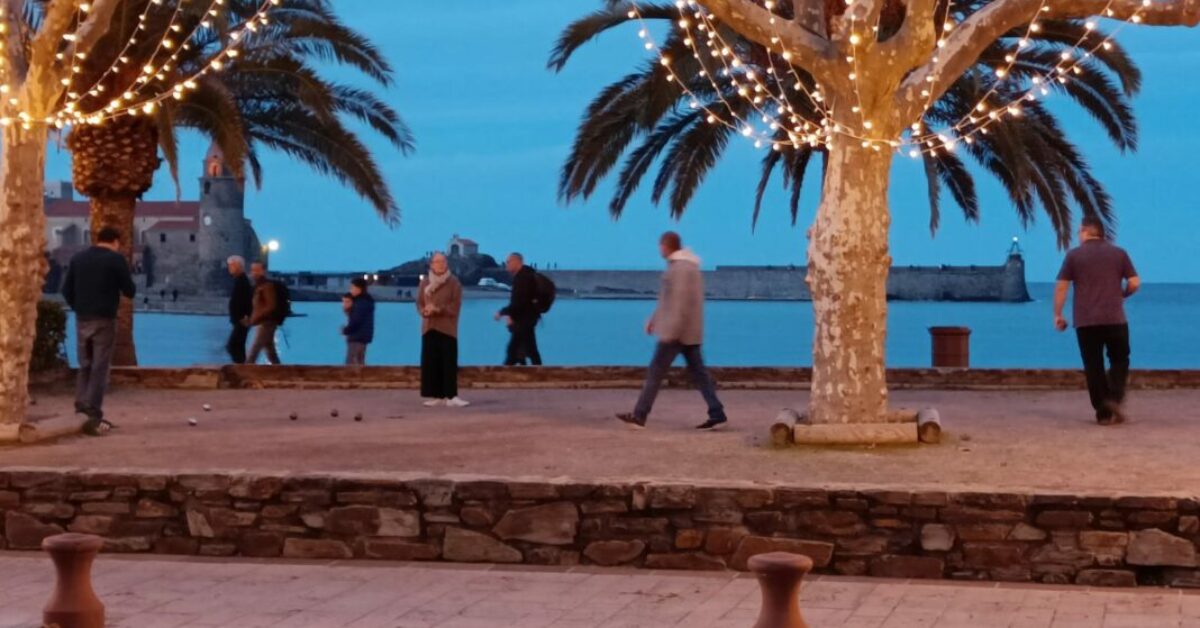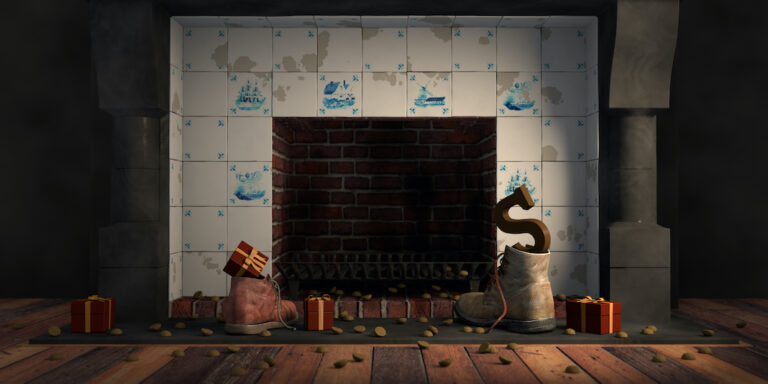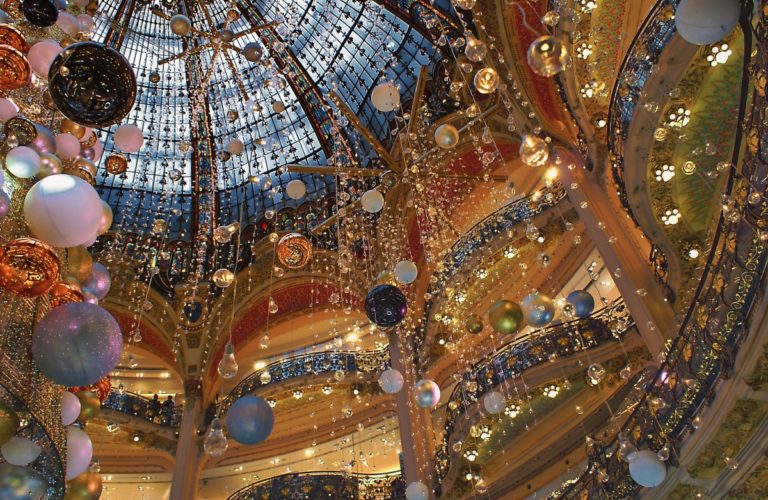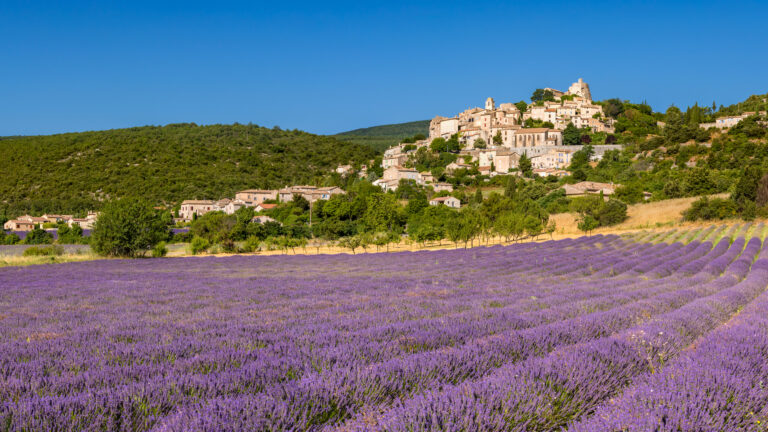Last December, my old friend Kathy and her husband moved from Los Angeles to Collioure. They discovered Collioure, in the southwestern corner of France, where the Pyrenees tumble into the Mediterranean, a few years after we did in 2010, and like us they fell in love. Kathy is the only person I know over the age of six who is unambivalent about the holiday season. Every year, the idea of cooking, baking, crafting, buying presents, and drinking a lot of mulled wine makes her happy in an uncomplicated way I’ve always envied. Kathy lives for the day department stores put up their holiday decorations. She takes no offense at all to the sexy Santa Christmas songs everyone else finds problematic. This year is her first holiday season living in France. And she sees no reason to adjust her holiday traditions.
Witness Thanksgiving: Kathy wanted to host Thanksgiving at their apartment, but soon the guest list outgrew the number of chairs, and I suggested we do it at our place. The French sometimes eat turkey for Christmas, but in the same way produce is seasonal, so is poultry. Eating a whole turkey in November is unheard of. If you want one, you have to order it from the boucher in late August, while you’re still wandering around in your bathing suit and complaining about the heat. We missed the boat, so our best alternative was a capon, le chapon, a big rooster, neutered young, and raised especially for a Thanksgiving sort of meal. To accompany the chapon, Kathy made cornbread stuffing, mashed potatoes, and gravy. Together we rued our lack of Ocean Spray cranberry sauce, the jellied kind imprinted with the seams of the can. But we did have black olives for putting on our fingers, and cornichons. We played Spotify’s Thanksgiving Jazz Mix.
Our French friends treated Thanksgiving with respect. They wore their black turtlenecks. They brought bottles of excellent champagne. When I told them that the bird would be carved at the table, and that watching the proceedings was part of the tradition, they dutifully paid attention, and one even carved!
I made my mother’s Damn Yams (so-called because she despised the dish, but was pressured into making it year after year.) The recipe is so simple our dog, Hugo, could do it: Boil and mash some yams, add an unholy amount of sugar, heavy cream, along with two beaten eggs and secret spices (nutmeg, all-spice, cloves), brush with melted butter, sprinkle with brown sugar, top with jumbo marshmallows and bake. My favorite part of the celebration was watching the look on our French friends’ faces at the sight of marshmallows, over here a snack food eaten only by children whose parents don’t care if their kids develop juvenile diabetes.
Before this year, I’d always viewed the freedom to skip Thanksgiving as a bonus gift-with-purchase upon immigrating to France. There was no Thanksgiving in France, and we lived in France, so why should we celebrate Thanksgiving? Christmas in France is generally low-key, lasting no more than 48 hours, as opposed to the bloated, month-long eat-and-shop-a-thon favored in the U.S. The thing everyone in France gets the most excited about, as far as I can tell, is eating a lot of shellfish on Christmas Eve for Réveillon, the long night that breaks at dawn on Christmas.
My holiday celebrations have always been mood dependent. When our daughter, Fiona, was little, we dutifully pulled out all the stops. We decorated the Christmas tree while sipping eggnog and listening to corny Christmas carols and hung huge stockings stuffed with tiny, carefully curated presents. Every year there was the traditional fake-out gift (one year we wrapped Fiona’s iPod in a heating pad box). We made blintzes on Christmas morning and on Christmas evening we went to a movie. After Fiona graduated from college and moved out, we indulged in the luxury of ignoring the whole thing if we felt like it. One year, we said ‘fuck it’ and spent ten days in Puerto Vallarta, Mexico.
But this year I’ve been struck by a species of homesickness that I never anticipated, and it’s changed my view.
The most frequently asked question I receive about moving to France is how I could leave my family and friends. Some people think I’m a selfish beast. An acquaintance said once, “I would LOVE to move to France, but I’m not that hard-hearted.” (Ouch.) Others have admired my ability to cut the apron strings, to appreciate that my thirty-year-old daughter has her own life. The late Washington Post columnist Michael Gerson wrote with poignancy about watching his son go off to college. “Parenthood offers many lessons in patience and sacrifice. But ultimately, it is a lesson in humility. The very best thing about your life is a short stage in someone else’s story. And it is enough.”
In my own defense, we moved to France in 2019, and I possessed mileage points in the five figures on Norwegian Air. It flew non-stop from Barcelona (our nearest international airport) to Los Angeles for a cool $600. I had big plans to fly back home and see my daughter many times a year. It would be easy! Then, the pandemic arrived. We were confined to within a kilometer of our house. International borders closed. Norwegian Airlines filed for bankruptcy and shuttered its long-haul service.
On the day the first case of Covid was diagnosed in Oregon, Fiona gave birth to a stunning baby girl, who’d inherited her mother’s elegant nose, her father’s long legs and cleft chin. Because of the lockdown, even had I lived a mile away, I would still have been watching my granddaughter grow and make her milestones on a screen. I just figured that when the world was back to normal (as if), I would fly to Portland as often as possible, and Fiona and her husband and baby would fly to Collioure. We had the future before us. In the meantime, as the pandemic wore on, Fiona and I texted or FaceTimed every day. A dear friend whose grandmother lives in Israel spent her girlhood summers there, and she feels close in a special way to this grandmother. I could easily imagine this for me and my own granddaughter. I would be her cool Mamie in France.
Then, one midnight at the end of this past October I received a text from Fiona. If we were still awake, could she call? Danna, one of my dearest and oldest friends, and Fiona’s godmother, with whom she was very close, was in the hospital. Danna had had an aortic heart valve replacement, performed laparoscopically and considered minimally invasive. But there had been complications, a tear in her aorta, and the surgeons were forced to perform emergency open-heart surgery to repair it. She was now in a coma.
I yawped. I howled. How was I not there, to rush to the hospital and hold my friend’s hand? How was I not there to comfort my daughter, who adored her godmother, the woman who had stepped in when I had followed my dream to move to France?
Danna died on Sunday, November 6. We attended her funeral via Zoom, where I could sob in the privacy of my own home, an ocean and a continent away.
This was the first and biggest loss of November. Others followed: a guy we were fond of here in the village was killed in a train accident. The next day our favorite waiter at our favorite café died of heart failure in his sleep. Two days later one of my writing students died of old age. The next week not one, but two, of Jerrod’s uncles passed away. Fiona’s dog died, also her cat. She also had to put down her first love, the horse she’d had since she was thirteen. There were so many losses, it began to simply feel absurd.
Homesickness is generally thought of as being place specific, a longing for a home, a town, a country, while nostalgia is a wistful feeling of yearning for a period or state of mind. Both states of mind convince us that what we’ve experienced in the past was wonderful, or at least better. I imagine the Germans, with their gift for creating long words that capture difficult human conditions (think schadenfreude), have a name for what I’m experiencing, the existential distress caused by the realization that time is passing, that while I’ve been engrossed in learning a new culture, a new language, a new way of being in the world, everyone else’s life has been moving on, too. Without me.
The irony is that part of what drew me to France was homesickness. Laguna Beach, where my parents had once owned a falling-down beach house, and where I spent my childhood summers, has long been compared to the south of France. The golden light, the emerald sea, the palm trees, sweet night-blooming jasmine and wild oleander, all remind me of summers on Gaviota Drive. My dad sold the falling-down beach house for a song a few months after my mother died, when I was seventeen. Even if I could afford to live there (a recent Redfin listing put the price at over ten million), I wouldn’t want to; as much as I loved my life there, that time is over.
And yet, living in Collioure reminds me of living in Laguna, with a French twist. Every time I swim in the sea, which is most days, I feel exactly as I did when I was a girl, standing on the deck, my fingertips pruny from hours spent in the ocean, my swimsuit dripping, wolfing down a baloney sandwich and potato chips. My wrinkled fingers, the salty chips, my desire to run back down to the beach. I am blessed every day to be able to inhabit that carefree girl. But it’s come at a price.
This Christmas, our fourth in France, inspired by Kathy’s Thanksgiving extravaganza, we’re going to do it up right. In the face of so much loss, I’m feeling like we need to celebrate the fact we’re simply around to celebrate. We’re resurrecting our old homemade English toffee recipe, and will give cunning little boxes of it to our French friends and neighbors. We’ve purchased a sizable tree, and will decorate it with ornaments gleaned for a few euros per dozen from a vide grenier. Over Zoom, Fiona and I will engage in our annual viewing of “Love Actually,” something we used to do every year with Danna. I have no doubt we will both cry when Alan Rickman buys the office tart that stupid necklace, shattering Emma Thompson’s heart. Also, our neighbor, Marc, has informed us that our rue’s big New Year’s Eve fête will be held at our place this year. Like Thanksgiving, the guest list has gotten a little out of control. Also, I’m told, our back deck will make a perfect dance floor.
I’m here for it all, as long as it lasts.
Karen Karbo is a frequent contributor to Frenchly. Her 2021 essay, Au Revoir Thanksgiving was the germ for this column, Rue du Soleil. Karen is the author of fourteen award-winning novels and works of non-fiction including the international bestseller, The Gospel According to Coco Chanel. Her essays, articles and reviews have appeared in Elle, Vogue, O., The New York Times, Tin House, Salon, Slate and elsewhere. To connect with her, buy her books, and learn about her writer’s retreat in Collioure, please visit her website here.
Photo credits, Karen Karbo, top to bottom: “Christmas petanque;” “Thanksgiving with our French friends: the traditional carving of the turkey, even though this wasn’t actually a turkey;” “Christmas at the beach;” “I do love a festive wreath;” and “Our addictive English toffee, a holiday tradition.”
This article was originally published on December 16, 2022.










